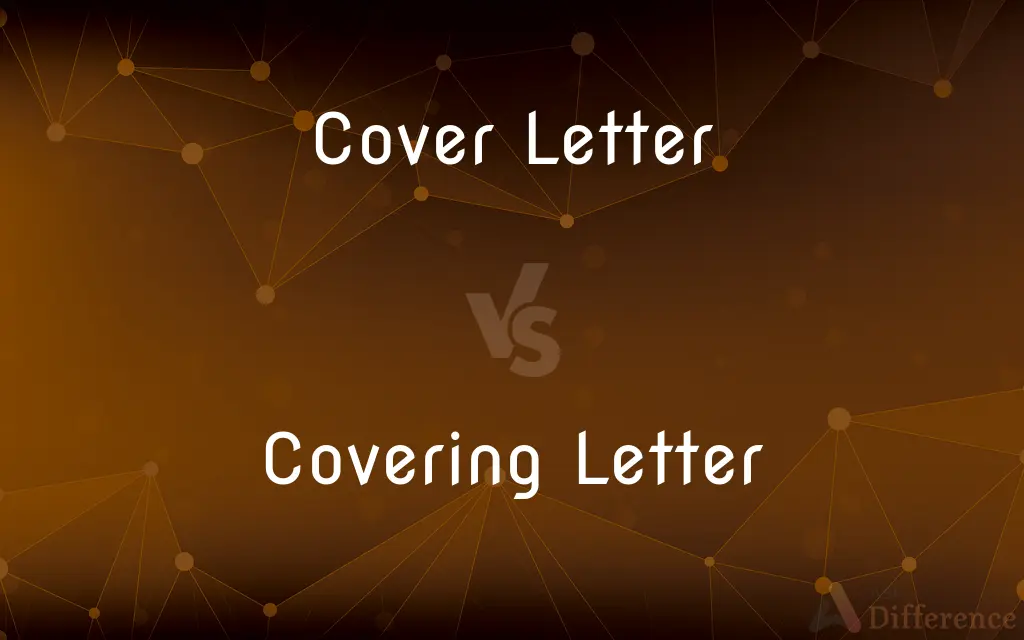Cover Letter vs. Covering Letter — What's the Difference?
By Tayyaba Rehman — Published on November 22, 2023
A Cover Letter is a document accompanying a resume; a Covering Letter is the British term for the same concept.

Difference Between Cover Letter and Covering Letter
Table of Contents
ADVERTISEMENT
Key Differences
A Cover Letter is commonly recognized in the U.S. as a document sent with a job application, highlighting a candidate's qualifications and fit for a job. On the contrary, a Covering Letter is recognized predominantly in the UK and refers to the same type of document.
The primary objective of a Cover Letter is to introduce the applicant and draw attention to specific elements in the resume. Likewise, a Covering Letter serves this purpose in the UK, aiming to attract an employer's interest to the CV of the candidate.
While the terminology differs, the content of both a Cover Letter and a Covering Letter is quite similar. They address the hiring manager, discuss the position in question, and detail the applicant's strengths relevant to the role.
In essence, whether someone uses the term Cover Letter or Covering Letter often depends on their geographical location or cultural context. Despite this difference in naming, their purpose, format, and importance in the job application process remain consistent.
Comparison Chart
Common Usage
Predominantly in the U.S.
Predominantly in the UK
ADVERTISEMENT
Purpose
Introduce applicant and resume
Introduce applicant and CV
Associated Document
Resume
CV
Content
Highlights qualifications
Emphasizes relevant skills
Cultural Context
American English terminology
British English terminology
Compare with Definitions
Cover Letter
A Cover Letter is a brief document, typically one page.
She kept her Cover Letter concise, ensuring it was a single page.
Covering Letter
A Covering Letter is tailored for each job application.
She personalized her Covering Letter to match the company's core values.
Cover Letter
A Cover Letter introduces the applicant for a job position.
I enclosed my resume and Cover Letter for the marketing position.
Covering Letter
A Covering Letter can clarify gaps or transitions in the CV.
In the Covering Letter, he explained his one-year sabbatical to study.
Cover Letter
A Cover Letter supplements a resume with additional information.
The Cover Letter detailed her specific experience in event planning.
Covering Letter
A Covering Letter introduces the candidate for employment.
Along with my CV, I've attached my Covering Letter for the managerial role.
Cover Letter
A Cover Letter focuses on the applicant's fit for the role.
The Cover Letter emphasized her passion and qualifications for teaching.
Covering Letter
A Covering Letter elaborates on key achievements.
The Covering Letter highlighted her role in increasing sales by 20%.
Cover Letter
A Cover Letter addresses the hiring manager directly.
In the Cover Letter, he expressed his admiration for the company's mission.
Covering Letter
A Covering Letter provides context for the attached CV.
His Covering Letter described his decade-long experience in finance.
Common Curiosities
What is a Cover Letter?
A Cover Letter is a document accompanying a resume, detailing an applicant's qualifications for a job.
Should I use 'Cover Letter' or 'Covering Letter' in my job application?
Use "Cover Letter" for U.S. applications and "Covering Letter" for UK applications.
What is the main aim of a Cover Letter?
The aim of a Cover Letter is to provide context to the resume and emphasize the applicant's suitability for the position.
Is the content of a Cover Letter and a Covering Letter different?
No, their content is similar, focusing on introducing the applicant and highlighting relevant qualifications.
Can I use the same Cover Letter for multiple job applications?
It's best to tailor each Cover Letter or Covering Letter to the specific job and company you're applying to.
Why is a Covering Letter important in the UK?
A Covering Letter helps employers understand an applicant's motivations and fit for a role, complementing the CV.
Should my Cover Letter address someone specifically?
If possible, address the hiring manager by name; if not, "Dear Hiring Manager" is an acceptable salutation.
How is a Covering Letter different from a Cover Letter?
A Covering Letter is the UK term for a Cover Letter; they serve the same purpose but differ in naming based on region.
How long should a Cover Letter or Covering Letter be?
Typically, both should be concise, about one page in length.
Are Cover Letters and Covering Letters optional?
While some employers might not require them, they are valuable in providing context and showcasing your interest in the role.
What should I avoid in a Cover Letter?
Avoid being overly generic, repeating your resume verbatim, or including irrelevant information.
Do I always need a CV with my Covering Letter?
Typically, yes. A Covering Letter complements the CV, providing additional insights.
Can I explain employment gaps in my Covering Letter?
Yes, a Covering Letter is an appropriate place to clarify any gaps or unique circumstances.
Is the format for a Cover Letter and Covering Letter the same?
Generally, yes. Both should be professionally formatted, well-organized, and error-free.
Should I include personal hobbies in my Cover Letter?
Only if they are relevant to the job or showcase skills applicable to the position.
Share Your Discovery

Previous Comparison
Evergreen Forest vs. Deciduous Forest
Next Comparison
Sunglasses vs. Cooling SunglassesAuthor Spotlight
Written by
Tayyaba RehmanTayyaba Rehman is a distinguished writer, currently serving as a primary contributor to askdifference.com. As a researcher in semantics and etymology, Tayyaba's passion for the complexity of languages and their distinctions has found a perfect home on the platform. Tayyaba delves into the intricacies of language, distinguishing between commonly confused words and phrases, thereby providing clarity for readers worldwide.
















































